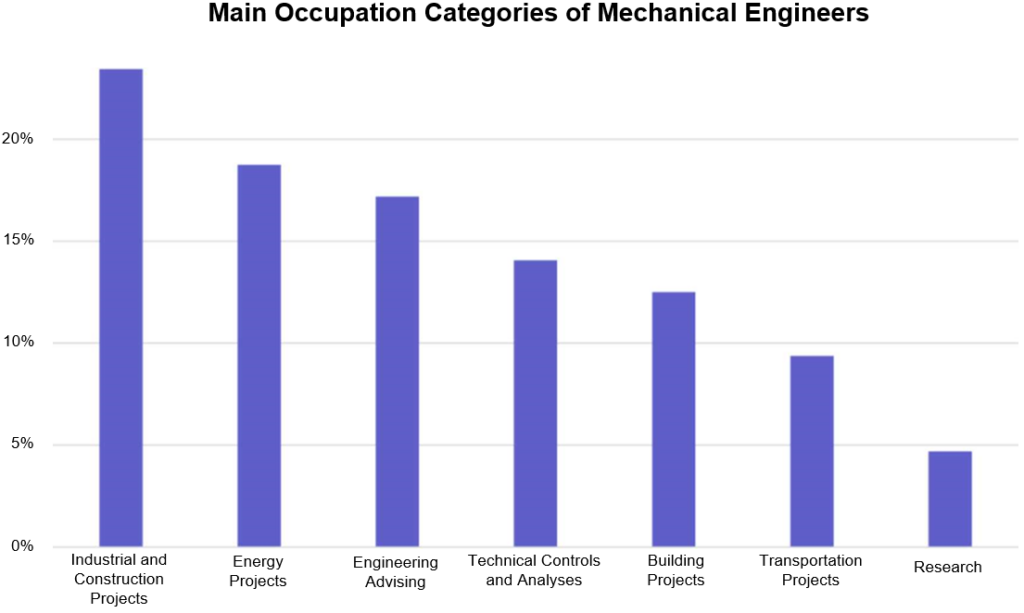Graduates of a Department of Mechanical Engineering are active in a very broad field of professional employment, which extends practically throughout the labor market. More specifically, his areas of employment are analyzed as follows:
- INDUSTRY, with indicative tasks in:
- Production
- Quality Control
- Application of Quality Assurance Standards, Environment (ISO 9000, 14000 systems, etc.)
- Maintenance
- Production and Product Design Studies
- Energy management
- Logistics
- Procurement – Raw Material Inventory Management
- Sales
- TECHNICAL OFFICE, with the main object of preparing studies, such as:
- Studies of Mechanical Installations
- Economic studies
- Environmental Impact Studies
- Occupational Risk (Safety) Studies
- Energy Studies
- Natural Gas Studies
- CONSTRUCTION, COMPUTER MAINTENANCE OF BUILDING AND INDUSTRIAL FACILITIES, indicatively concerning:
- Construction / Maintenance of Heating, Cooling, Ventilation and Air Conditioning systems
- Construction / Maintenance of mechanical equipment and installations (e.g., Elevators, generators, compressed air and gas networks, etc.)
- Επίβλεψη Συστημάτων Ενεργειακής Διαχείρισης Κτιρίων
- Construction, Maintenance and Design of Buildings and Industrial Facilities
- TRADE, with object:
- Technical Sales
- Promotion and Display of Products
- SECURITY TECHNICIAN, either as a freelancer, or as an employee in a protection and prevention services company
- ENVIRONMENTAL APPLICATIONS, concerning for example:
- Design, installation and operation of environmental protection projects
- Design, installation and maintenance of decontamination systems
- Design, installation and maintenance of wastewater treatment plants (biological treatment)
- NATURAL GAS
- Construction, Maintenance and Operation of Networks
- Trade in related equipment
- ENERGY
- Energy projects
- Energy saving
- Energy Inspection
- Trade in related equipment
- TECHNICAL ADVISOR to organizations and large enterprises
- TECHNICAL SERVICES of the Government, organizations and large companies
- SUPPLY CHAIN, TRANSPORTATION
- EDUCATION, APPLIED RESEARCH & DEVELOPMENT
The figure below shows the employment rates of Mechanical Engineers by their main employment category. From the figures listed it follows that the largest percentage of mechanical engineers, approximately 24%, are employed in industrial and construction projects.

Given the political will, within the framework of European cooperation, to quickly harmonize the Greek energy market with modern international trends, perceptions and imperatives regarding the adoption of new advanced energy technologies and environmental goals, in the coming years changes will be made in the country that will lead to a radical restructuring of the energy map. Important goals that have been set are to increase the energy produced from Renewable Energy Sources, improve energy efficiency, save energy, protect the environment and expand and strengthen the domestic and international transmission networks of electricity, natural gas and oil. More specifically, according to the updated National Plan for Energy and Climate the goals set until 2030 are to increase the participation of RES in final consumption to 45%, in power generation to 80%, in heating and cooling to 47%, in transport to 32 % and 100% electrification in passenger vehicles. All of the above is expected to create 38,000 new jobs in RES and building upgrades by 2030 [1] .
At the same time, the 4th industrial revolution is predicted to lead to a complete transformation of the existing industrial production process and of business in general. Recent research by Bank of America [2] predicts an increase in the automation of production through robots, on a global scale, from 10% in 2015 to 45% in 2025. At the core of the above changes are also the technologies of 3D printing of entire machines or their components.
[1] https://www.ot.gr/2023/01/18/energeia/esek-ependyseis-30-dis-kai-38-000-nees-theseis-ergasias-se-ape-kai-anavathmisi-ktirion -eos-to-2030/.
[2] K. Fotakis, A. Selimis, “Greece facing the 4th industrial Revolution”, Institute of Alternative Policies, 2018.
